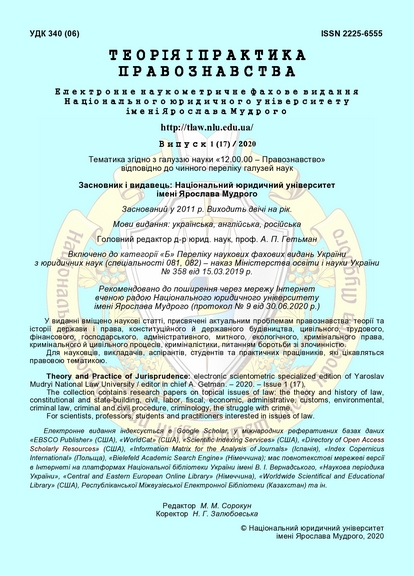Constitution as a pragmatic model of system of Ukraine: value for law-enforsment activities
DOI:
https://doi.org/10.21564/2225-6555.2020.17.206291Keywords:
Constitution of Ukraine, model of the state system of Ukraine, crime preventionAbstract
The modeling of social processes in rulemaking is still not perfect. The aim of the article is to improve the normative regulation of crime prevention measures. The purpose of the article is to analyze the Constitution of Ukraine as a verbal model of the state system of Ukraine. We justify the Constitution as a pragmatic verbal model of the system of the state of Ukraine on the basis of the theory of system engineering.
A model is a specially designed object for research and problem solving (material or abstract) that has the required degree of similarity to the modeled object and is adequate for the purpose of the study. Pragmatic models are a form of organizing (displaying) knowledge of the intended (created) object system. Therefore, the Constitution of Ukraine, laws and regulations are pragmatic verbal models.
The construction of a model of the system can be carried out subject to the preliminary definition of: 1) the context of the model; 2) the author’s point of view; 3) modeling goals.
The system model should have the following properties: 1) simplicity; 2) limited; 3) adequacy; 4) loyalty.
In the Constitution of Ukraine as a model of the state system, these properties are provided in different ways. Adequate is called a model where completeness, accuracy, and truthfulness are realized to the extent that ensures the achievement of the goal of modeling.
The purpose of constitutional modeling is to build a verbal model of the state system that would reflect the compelling circumstances in which the system functions - the purpose, elements, and relationships. As a goal of the system of the state of Ukraine, Article 3 of the Constitution outlines human rights and freedoms.
Elements of the System of State Ukraine are: Verkhovna Rada of Ukraine, President of Ukraine, National Security and Defense Council of Ukraine, Cabinet of Ministers of Ukraine, local state administrations, courts, Constitutional Court of Ukraine. Connections of elements of the system of the State of Ukraine. Legislative, executive and judicial bodies shall exercise their powers within the limits established by this Constitution and in accordance with the laws of Ukraine (Article 6 of the Constitution)References
Аrshinova, О.І., Shevchenko, А.V. (2008). Systemnyj analiz. Кyiv: NAU [in Ukrainian].
Yelchaninov, D.B. (2009). Systemolohichnyy pidkhid do analizu ta prohnozuvannya v derzhavnomu upravlinni. Stratehichni pryoritety, 2 (11), 82–87 [in Ukrainian].
Lyamets’, V.I., Uspalenko, V.I. (2015). Osnovy obshchey teorii sistem i sistemnyy analiz. Khar’kov: BURUN i K. [in Russian].
Liamets’, V.I., Teviashev, A.D. (2004). Systemnyj analiz. Vstupnyj kurs. Kharkiv: KhNURE [in Ukrainian].
Metody issledovaniy i organizatsiі eksperimentov. (2002). K.P. Vlasov (Ed.). Khar’kov: Humanitarniy tsentr [in Russian].
Obolentsev, V.F. (2016). Bazovi zasady systemnoho analizu zapobihannya zlochynnosti v Ukrayini. Kharkiv: Yurayt [in Ukrainian].
Obolentsev, V.F. (2018). Bazovi zasady systemnoho analizu systemy derzhavy Ukrayiny. Kharkiv: Pravo [in Ukrainian].
Pro optymizatsiyu systemy tsentralʹnykh orhaniv vykonavchoyi vlady: Ukaz Prezydenta Ukrayiny vid 09.12.2010 r. № 1085/2010. Uriadovyi kurier, 234.
Soroka, K.O. (2005). Osnovy teorii system i systemnoho analizu. Kharkiv: FOP Tymchenko [in Ukrainian]
Downloads
How to Cite
Issue
Section
License
Copyright (c) 2020 Theory and practice of jurisprudence

This work is licensed under a Creative Commons Attribution 4.0 International License.




